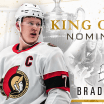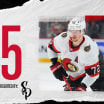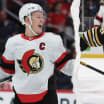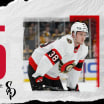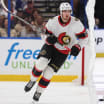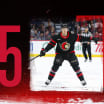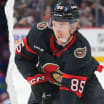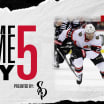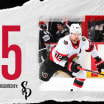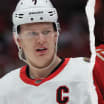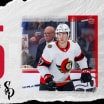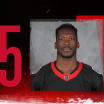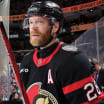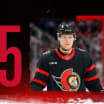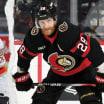On the eve of the regular season, we sit down for an in-depth conversation with Sens head coach Guy Boucher who finds himself back in the NHL after two and a half years of coaching Europe and discusses the positive impact the move has had on his family, his career and his perspective.
A conversation with Guy Boucher
The coach talks about instilling good habits, the psychology of giving the players something to strive for and more.
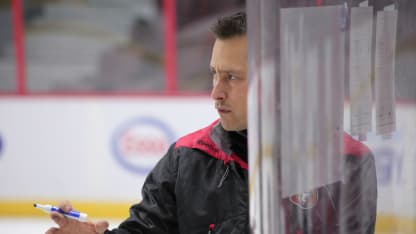
By
Craig Medaglia @craigmedaglia / Ottawa Senators
There are some snippets of dialogue below or you can click here to listen to the full conversation.
Craig Medaglia:I know you've seen the inside of this building a lot since being hired, but how have you and your family settled in to Ottawa so far?
Guy Boucher:People have been unbelievable here. It's really impressive how nice people are here and how welcoming they are and how they want to help you. It's bilingual too so it's perfect for our kids. Up to now, we've really gotten everything we wanted out of this.
CM:You mentioned during the summer that this coaching staff takes a committee approach. Are you happy with the roles that the coaches have played so far?
GB:I have the final decision on everything obviously. Guys know that I'm persistent in what I want but I'm very relational. I like to take everybody's opinion first but then I run with mine meaning that what I decide might be someone else's idea, it might be part of someone else's idea but once I have it and I run with it…I'm ferociously persistent in what I want. It was important to me to be surrounding by strong people.
CM:Your practice style emphasizes "speed and pace", can you explain the psychology behind using consequences (push-ups, laps, etc...) as a teaching tool?
GB:The push-ups and laps, a lot of it is not making the guys accountable, it's my conditioning. I don't do conditioning after practice, I do it between drills and I do it on purpose. I know they are tired from the drill and I go beyond their comfort zone. Then they get their little rest and then start right away. Right now I'm doing a lot of teaching so the practices aren't going as fast as I'd like them to be and then some people say that they are the toughest practices they've seen here. For me, I know what my standard is and I want to get to it. I can't get there yet but there's a part that's conditioning and yeah there's accountability.
CM:You are clearly very detailed oriented. Have you been seeing the results that you're looking for so far in training camp?
GB:I'm all about habits. Habits aren't something you do sometimes. They're something that you do all the time or else you can't call them habits. You can't ask for habits if they're not doing it constantly. You saw my smile today because the guys know that whenever they don't come full-speed then they are skating because I want them on all the time.
CM:I've seen you set some very specific short-term goals for this team (keeping the shots in Saturday's game under 25, clearing the defensive zone in less than 11 seconds in practice, etc…). Are you happy with how the team has embraced these quantifiable goals?
GB:I've done that everywhere I've been. For me, these are competitors. If you don't give those guys something to strive for then they are not striving for anything. I know because I was one of those guys, I was a hockey player. Sometimes it's a stupid little thing like a competition for a chocolate bar and all of a sudden they want to kill each other for it. That's how I find that you get the guys to be at the pace that they're going to be at during the game. You just give them something to strive for.
CM:On numerous occasions I've heard you reference "the old me" when speaking to the media. What would you say is the biggest difference between coaching in the NHL versus any other league?
GB:60% of my job I'd say is hockey and the big difference with the NHL is everything else. I've gone to Europe, coached in the American League, coached Junior, coached in College, coached Midget and the one thing is as you move up as a coach, the less you control. You think the opposite but no. The closer you are to being an NHL coach and then once you're in the NHL, you control less because there are trades, there's contracts, there's media, there's the big picture, the traveling. All sorts of stuff that you need to deal with that you don't deal with before you're (in the NHL). What I've learned, is not to spend my time on some things that I don't control. That's the biggest difference. There's 40% that I know I don't control and it's as much as 40% so instead of fighting to try and control these things or worrying about these things, I've learned to just put those aside and focus on that 60% that I can control really well. That's what has changed for me.
The puck drops on the regular season tomorrow (Wednesday night) at 7:30 p.m.at home against the Toronto Maple Leafs.

